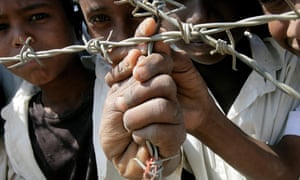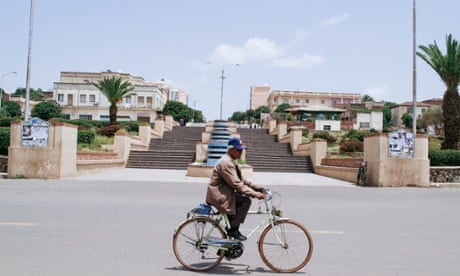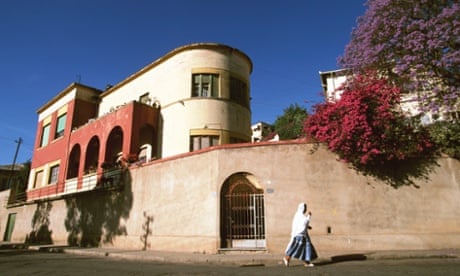More Eritreans filed for asylum in the UK in the year to June than any other nation. They face "systematic, widespread and gross human rights violations" at home, says the UN.
Around 6 per cent of Eritrea’s population lives outside the country, and thousands more flee every month. But why?
On the one hand the Eritrean government has much to be proud of. The country is achieving “unprecedented” success in meeting its Millennium Development Goals, particularly in the field of healthcare.
But the other side of Eritrean society is a dark and shocking place.
A recent United Nations report found that "systematic, widespread and gross human rights violations have been and are being committed in Eritrea under the authority of the government".
Eritreans make up a large number of those fleeing across the Mediterranean to Europe - around 15 per cent of the total reaching Europe’s sea border are from the country.
And the reason commonly cited for the dangerous journey to Europe - Eritrea’s national service, which though legally compulsory for 18 months, in reality amounts to "indefinite enrollment in the military where conscripts are used as "forced labour", according to the UN.
The history
Modern day Eritrea emerged from a war of independence fought over the annexation of the former Italian colony by Ethiopia. In 1993, at the end of a thirty-year military campaign carried out by the Eritrean Liberation Front and the Eritrean People's Liberation Front, the country's people voted overwhelmingly in favour of independence in a UN-monitored referendum.
Isaias Afewerki, leader of the EPLF, was appointed president and promised elections - but in 1997 these elections were postponed indefinitely. They have never taken place.
A constitution was also drawn up - based on the principles of equality, social justice, democratic principles and human rights. It has never been implemented.
In June, the UN's Commission of Inquiry on Human Rights in Eritrea reported its findings.
"The struggle for the independence of Eritrea is recorded in history as a major feat of a people's fight for self-determination," the report reads.
"The commission finds that the current situation of human rights in Eritrea is the tragic product of an initial desire to protect and ensure the survival of the young state that very quickly degenerated into the use of totalitarian practices aimed at perpetuating the power of the Eritrean People's Liberation Front."
_LRG.jpg)
A migrant from Eritrea simulates what she says is a torture technique during a protest outside the European Union delegation in Israel, in Ramat Gan near Tel Aviv June 25, 2015
Abuses
The UN report, which has been rejected by the Eritrean government as an effort to undermine the government, describes a country where people live in fear and officials and security forces carry out gross human rights violations with impunity.
Extra-judicial killings, torture, enforced disappearances and arbitrary arrest all take place, the report says.
A former Eritrean interrogator told the UN: "Torture includes beating with whips, plastic tubes and electric sticks, standing [under the sun] on a very hot sunny day at noon, tying the hands and feet like the figure of eight, tying the hands and feet backwards (known as "helicopter"), tying to trees, forcing the head down into a container with very cold water, beating the soles of the feet and the palms.
"In addition, the interrogator is allowed to use whatever fantasy comes to his mind."
Civilians live in a climate of fear created by "extensive spying and surveillance" and there is a "constant fear" that the security services are monitoring people's activities.
"The existence of such a pervasive control system generates a general climate of fear and mistrust in communities and even within families," the commission found.
The Eritrean government has dismissed the findings of the reports, saying: "Country-specific resolutions and mandates are in breach of the United Nations principles of impartiality, objectivity and non-selectivity."
With regards press freedom Eritrea is often considered to be on a par with North Korea, and the Committee to Protect Journalists list Eritrea as the most censored country in the world.
But the reason cited by many for leaving the country, and facing the perils of human-trafficking gangs and dangerous sea crossings, is national service.
Indefinite military service
National service was brought in in 1995 in Eritrea. It is intended to last for 18 months, including six months training at Eritrea's military academy SAWA, for all 18-year-olds.
The reality, according to the UN, "children are often forcibly recruited and conscripts end up serving for an indefinite period of time".
Conditions in military service, the UN commission found, includes inadequate access to food, water, hygenic facilities, accommodation and medical services.
Violence is reportedly regularly used as punishment, in some cases amounting to torture.
And for women and girls conscripted, the abuse does not stop there. Officials pick out the prettiest military trainees to serve them domestically, and these conscripts are often sexually abused or raped, the UN said.
The UN commission heard from conscripts who said that the abuse of females during military training was "normal".
"Over 70 per cent of the girls were violated like that," one said.
"Students are not allowed to go to the officers' rooms, but sometimes the officers ask them to come to their house.
"The girls cannot say no because they know what will happen in training if they say no. When they enter the room, the officers tell them to take off their clothes and they abuse them. The girls do not report it."
Military service often entails manual work, called "forced labour" by the UN. Conscripts spend their time doing agricultural work or constructing roads, buildings and mine infrastructure - all for meagre pay.
The indefinite nature of military service prevents people from starting families, the report said. Conscientious objection does not exist in Eritrea, and those who desert or try to avoid service are said to be dealt with harshly.
The Eritrean government denies that military service is indefinite and at the end of 2014 is reported to have declared that service would be limited to 18 months, though this announcement was reportedly not made to the Eritrean public.
UK's tougher asylum controls for Eritreans
The UK Government has been accused of closing the door to thousands of asylum-seekers from Eritrea in an attempt to hit its discredited immigration target.
In March, the Government announced a new policy towards Eritrean asylum-seekers, saying that conscription is no longer automatic grounds for granting asylum because Eritrea has stopped the practice of indefinite military service.
However, Human Rights Watch (HRW) has criticised the UK's policy, saying it is based "almost exclusively" on a "discredited" Danish Government report.
The Danish document released this year claimed that Eritreans returning to their home country would not face punishment providing they signed a "letter of apology". It also said that Eritrea had stopped the practice of indefinite military service.
HRW said there is "no evidence" that the Eritrean Government have made these changes on the ground. "The reliance on a weak and discredited report suggests the Home Office is more interested in keeping asylum seekers out than in protecting people in danger," said Senior Researcher Gerry Simpson.
Diaspora tax in the UK
Even for the Eritreans that manage to claim asylum in the UK, freedom from the influence of the Eritrean Government is not a given.
In 2012 the UN Security Council banned the Eritrean Embassy from collecting a 2% tax from its UK diaspora by illcit means.
But despite the ban, complaints have been made that embassy is continuing to collect the tax from Eritreans resident in the UK by coercion and other illicit means. In March, a group of Eritreans presented the Met Police with a dossier of allegations that the tax was being extracted illegally.
The Met Police confirmed that had been contacted by members of Eritrean community about the issue. "Officers are assessing the information provided to them to establish whether any offence has been committed.", it said.
The Etrirean ambassador told the Foreign Office at the start of the year that it does not collect the tax, though it provides advice to those that wish to pay it voluntarily. It is understood that the embassy issues receipts for taxes paid on behalf of the diaspora in Asmara.
"The government of Eritrea requires all non-resident citizens to pay a 2 per cent diaspora tax in order to access services inside Eritrea. Many other countries, such as the US, levy a similar tax on their non-resident citizens.", an FCO Spokeswoman said.
Millennium Development Goals
Amidst this darkness, however, there is a positive story to tell about Eritrea.
The United Nations Development Programme praises the "remarkable progress" Eritrea has made in achieving its Millennium Development Goals - especially in health care.
Infant and child mortality rates in the country have reduced dramatically, as has maternal mortality.
Incidence of HIV/AIDS has plummeted from 45 per 100,000 people in 2001 to eight in 2012.
Since 1999, Eritrea's malaria mortality rate has fallen by 90 per cent.
However, the UN says more needs to be done - specifically in relation to the eradication of extreme poverty and hunger and universal primary education.
Despite the development progress, between 3,000 and 4,000 people leave the country every month. The UN's refugee agency estimates that more than 33,000 Eritreans live outside the country - around 6 per cent of the country's population.
Embargoes and sanctions
As a member of the UN and the EU, the UK observes an arms embargo on Eritrea. It is an open-ended ban on the export of arms and related military material to and from the country.
The UN sanctions were imposed in 2009 in response to findings by the UN Monitoring Group on Somalia that Eritrea had provided political, financial and logistical support to armed groups in Somalia.
The UK is one of Eritrea's main export partners for non-military goods.
Eritrea does not receive aid from the UK.
Source=http://www.channel4.com/news/africas-north-korea-why-do-people-flee-eritrea







































